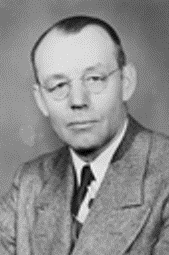Get Today in Masonic History into your Inbox. Sign up today for one of our email lists!
Need an article for your Trestleboard/Newsletter see our Use Policy
Harold Royce (H. R.) Gross is Born

Today in Masonic History Harold Royce (H. R.) Gross is born in 1899.
Harold Royce (H. R.) Gross was an American politician.
Gross was born on June 30th, 1899 near Arispe, Iowa. He attended local rural schools until 1916, when during his sophomore year he lied about his age to enlist in the military. During 1916 he served with the First Iowa Field Artillery during the Pancho Villa Expedition. From 1917 to 1919 he served with the United States Army in France. After the war he briefly attended Iowa State University in their engineering program before attending the University of Missouri School of Journalism.
In 1921, Gross started working for newspapers as a reporter. He worked in the newspaper business until 1935. From 1929 to 1935 he was the editor of the Iowa Union Farmer. In 1935 he went into radio broadcasting, first working for WHO in Des Moines, Iowa. One of his fellow broadcasters at the station was future President Ronald Reagan.
In 1940, Gross entered the political world when he ran against the incumbent Governor of Iowa. Reporters referred to his campaign as the "sight-unseen" campaign. Gross refused to make any public appearances and made no campaign speeches. Everything he did was over the radio. Despite his lack of public appearances he lost the race by 15,781 votes of the 330,000 cast. It was the closest election Iowa had seen in thirteen years. His campaign was also haunted by a comment he had made seven years earlier when he seemed to imply an angry mob was right in attacking a judge to stop a foreclosure. After his loss, he started working at an Ohio radio station, then moved to Indiana before returning to Iowa after World War II.
In 1948, Gross ran against the Republican, Gross' own party, incumbent to the United States House of Representatives. This time Gross was successful, winning the primary without any party support. He won the general election despite Harry S. Truman carrying the state in the presidential election.
During his time in Congress, Gross was known as a strong fiscal conservative. He denounced everything he felt was a waste of taxpayer money. This included the John F. Kennedy funeral, including the fuel for the eternal flame, the size of the White House security detail, the Peace Corps, the United States Space Program and foreign aid. He also spoke strongly about Congressional Junkets and refused to part of any such waste of taxpayer money. In his private life he was just as frugal, rarely attending the lavish parties associated with the life of a politician.
Gross also opposed the Vietnam War. His one regret during his time in Congress was his vote Gulf of Tonkin Resolution, he voted "present" rather "nay" during the vote. He also denounced an extravagant White House Ball held in 1966. The ball ran to 3 a.m. Out of disgust for the callousness of the ball, Gross recited the The Victory Ball by poet Alfred Noyes. The poem was about the hedonism of a British Armistice ball after World War I and contains the line "under the dancing feet are the graves."
Gross was known in Congress as being independent often going against his own party. Then minority whip, Gerald Ford once noted "there are three parties in the House: Democrats, Republicans, and H.R. Gross." Once when the Eisenhower administration tried to pressure him to support a foreign-aid economic-development measure Gross quipped "I took my last marching orders in 1916–19."
It should be noted during Gross' time in Congress every year bill H.R. 144 was reserved for one of Gross' bills, 144 being a gross so the numerical equivalent of his name.
In 1974, Gross resigned from Congress rather than face another election battle. On his retirement the members of Congress took up a collection to send Gross and his wife on an around the World trip. He took the opportunity to make one last parting shot at this friends in Congress stating "Wherever we go, I am sure I'll see you all on your taxpayers' junkets!"
Gross passed away on September 22nd, 1987.
Gross was a member of Twilight Lodge No. 151 in Afton, Iowa. He was also a member of Petworth Chapter No. 16 Royal Arch Masons in Washington, D.C.
This article provided by Brother Eric C. Steele.

